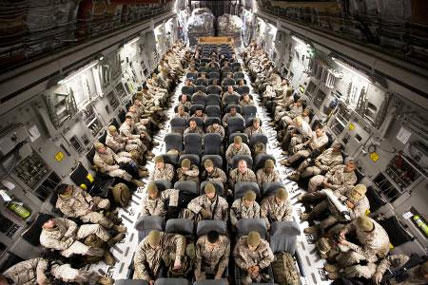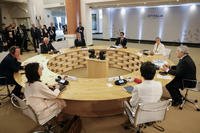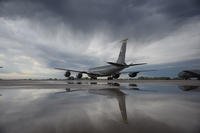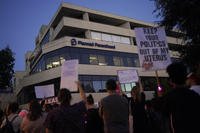Navy Secretary Ray Mabus told the last Marine combat units deploying to Afghanistan that there's no guarantee that parts of Afghanistan's southwestern Helmand province won't fall back into the enemy's hands like Fallujah did in Iraq.
"I sincerely hope not," Mabus said last Friday to several thousand Marines at Camp Pendleton, Calif., who began deploying to Afghanistan on Sunday. "I deeply, truly hope those gains will not be lost [in Afghanistan]," Mabus said.
However, "these things move into the hands of the Iraqis or the Afghans and it's up to them to provide security," Mabus told members of the 1st Marine Expeditonary Force. Headquarters units from I MEF began leaving for Afghanistan earlier this month and about 4,000 Marines will follow.
Several questions from Marines at the "All Hands" session with Mabus concerned Fallujah, the flashpoint Iraqi town in Iraq's western Anbar province that saw some of the heaviest fighting of the Iraq war. Last week, insurgents from what had been Al Qaeda in Iraq, now called the Islamic State of Iraq and the Levant, raised the black flag of Al Qaeda over Fallujah.
"I can't even imagine how it feels be the family of a Marine who was lost there," Mabus said. "Marines were sent into chaos and security systems unraveled there. Marines fought, were wounded and died there with great honor and purpose. It's tragic and unbelievable that the government of Iraq could not sustain what Marines fought for in blood to get," Mabus said.
Mabus echoed statements of Secretary of State John Kerry that the U.S. will support Iraqi government forces trying to retake Fallujah, but there were no plans to put U.S. troops on the ground.
About 140 of I MEF's 300-member command element, led by Brig. Gen. Daniel Yoo, had been scheduled to leave Camp Pendleton on Sunday for Camps Leatherneck and Bastion in Helmand province, but they didn't leave until early Monday.
In the coming months, I MEF (Forward), including 4,000 Marines and sailors from the 1st Marine Division, the 1st Marine Logistics Group and the 3rd Marine Aircraft Wing, will replace II MEF (Forward), which will return to Camp Lejeune, N.C.
The Marine statement said that I MEF (Forward), led by Lt. Gen. John Toolan, "will be the last major Marine Corps command to deploy to Afghanistan in support of Operation Enduring Freedom and is scheduled to return at the end of 2014."
Currently, about 50,000 U.S. and coalition forces are in Afghanistan. Under President Obama's plan, all combat forces will leave Afghanistan at the end of this year. Afghan President Hamid Karzai has balked at signing a new Bilateral Security Agreement with the U.S. that would allow for a follow-on training and advisory force to remain in Afghanistan after 2014.
"We're negotiating now about what kind of force to leave behind," Mabus said, but the Marines in Helmand "will be leaving them (the Afghans) one of the most stable situations in that country," Mabus said.
Current and former Marines like former Sgt. Roman Baca, who fought in Fallujah in 2005 and 2006, have expressed concerns about what has become of the place.
"It's really disheartening to see what's going on right now," Baca said. "I'm just kind of hearing from fellow Marines I served with and looking back at the experiences we had over there."
His first concern, he said, is for "the locals and the interpreters we worked with and how they're faring, how they're now back in the mix of violence and danger." Back when he was patrolling the area, Marines often engaged the locals, including the kids, to win their confidence and trust.
"All those kids are now 13 to 16 years old and they're right back in a violent situation," he said. "The interpreters, if they're not able to take advantage of the program to come to the U.S., they're still working in the same area.
Baca went back to Iraq in 2012, this time on a State Department cultural exchange grant that enabled him to put on dance workshops with Iraqi students ages 16 to 24. He worked with the students as they choreographed a program about being young in Iraq and dealing with the war and the struggles. The students, some Arab and some Kurds, performed the show at a community theater.
"All they kept saying is we want a better Iraq, we want a safer Iraq, we want to be a country where we can do the things we aspire to do and be safe and not have to worry about doing them," Baca said.





























